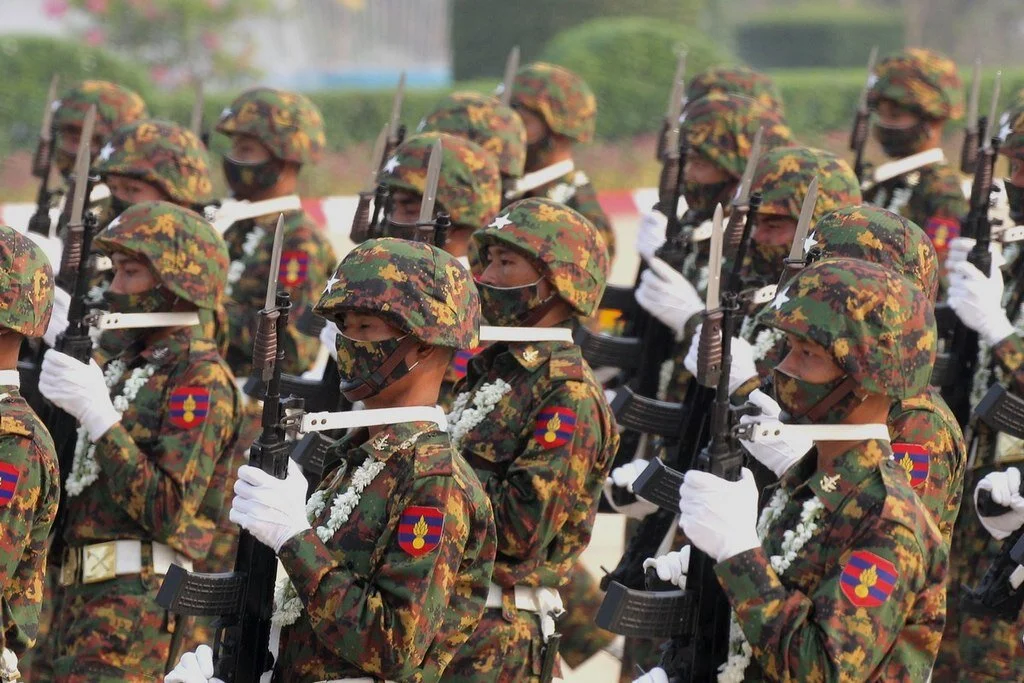A Look Inside the Myanmar Military
Myanmar’s military is at war with its country’s people and it appears unlikely that they will stop the fight without international interference.
Myanmar’s military has been under global scrutiny for the last few years due to the continued ethnic cleansing of the country’s Rohingya population. The Rohingya, a primarily Muslim ethnic minority, have been fleeing violence from the primarily Buddhist government and military since the 1970s. In the last several years, the ethnic cleansing has increased as the military continues to kill and rape Rohingya men, women, and children in an attempt to exterminate the Muslim population within Myanmar.
In the last few months, the Military regained international headlines as it staged a coup to bring an abrupt end to what was several years of semi-democracy in Myanmar. The coup has led to several weeks of pro-democracy protests, which quickly turned deadly as the military began to kill protesters on the streets. It is now estimated that since the start of the protests, the military has killed more than 600 Myanmar citizens, many of whom are children. Some children have been shot in their own gardens or walking on the street, for the military intends to send a clear message that resistance will be met with indiscriminate killing.
To understand the situation in Myanmar and why it will likely not end without international involvement, one must examine the nature of the Myanmar military and its relationship to the country’s other citizens.
For those in Myanmar, the county’s military is known as the Tatmadaw and comprises approximately 500,000 soldiers. For the soldiers, their wives, and children, the Tatmadaw represents a separate and superior society to that which normal Myanmar citizens live in. The majority of the soldiers grow up within the Tatmadaw society and are taught that they are the protectors of Buddhism and that their enemies are all that oppose Buddhism or the military’s rule. This military society is completely detached from that of greater Myanmar, for the Tatmadaw have their own banks, schools, hospitals, stock options, and more. Those who are raised within the military marry others in the Tatmadaw society, ensuring the continued separation from the general population.
Soldiers, along with other members of the Tatmadaw, are fed an ideology by their superiors via controlled media that they are far superior to normal civilians and maintain an exceptionally important role in the protection of Buddhism. This understanding has led the Tatmadaw to kill and abuse ethnic and religious minorities for decades, and recently the general Myanmar population as they protest military rule. The domestic focus of the military has led the Tatmadaw to be known as the Military that Murders Its Own People.
The New York Times interviewed a Tatmadaw doctor who described his desire to stop working for the military and leave. He said if he were to quit he would be put in prison, and if he were to run away the military would torture his family. Since the coup, the military has increasingly focused its surveillance internally. The vast majority of soldiers and their families live in military-controlled compounds, where their every step is monitored. Most soldiers have not been able to leave the area for more than 15 minutes in recent weeks.
It is hard to say what is in store for the future of Myanmar, but the nature of the Tatmadaw means that real political change is unlikely without international involvement. The military is in complete control of the country, and the top-down controlled nature of the Tatmadaw society means that internal military rebellion is, at this point, unlikely. There have been increasing numbers of defectors of the Tatmadaw, but not enough to risk the military control.
The current year-long military takeover that is planned by the Tatmadaw is unlikely to be a long-term solution, for it will isolate the country from non-Chinese trade partners. While many described the pre-coup political structure in Myanmar as a false democracy, it greatly increased the potential for the country’s international trade and cooperation. The coup has led countries like the United States and the United Kingdom to place sanctions on the military, opting for economic rather than physical opposition to the Tatmadaw rule. Some argue that even China might be against this new political system, for the unpredictability of military rule is less beneficial to China’s regional and economic interests. This political and economic isolation marks the military’s current grip over Myanmar as unsustainable, but it is unclear when change might come.
Furthermore, even if the Military secedes to the ‘democratic’ system that was in place before the coup, it might not be enough to rebuild the country’s political and economic relationships.
The international community must, at minimum, maintain strong economic sanctions against the Myanmar military, for the nature of the Tatmadaw means that they are unlikely to cede to democracy, stop fighting their own citizens, and stop ethnic cleansing unless forced to do so.
Image courtesy of Mil.ru via Wikimedia Commons, © 2021, some rights reserved.



